Social Psychology: Analysis of Theory of Planned Behavior in Context
VerifiedAdded on 2022/11/28
|8
|2405
|390
Report
AI Summary
This report delves into the realm of social psychology, focusing on the Theory of Planned Behavior (TPB) as introduced by Icek Ajzen, and its application in understanding and predicting individual behaviors. The report explores the TPB's extension of the Theory of Reasoned Action, emphasizing the role of individual beliefs, attitudes, and perceived behavioral control in shaping intentions and actions related to various health behaviors and social issues. It highlights the significance of attitude change, social cognition, and interpersonal relationships within the framework of social psychology. The report discusses the theory's application in addressing behavioral problems, such as those related to aggression and discrimination, and examines how the TPB can be utilized to modify attitudes and behaviors in various contexts, including consumer behavior and advertising campaigns. Furthermore, it references key studies and research, including those by Ajzen, Baumeister, and others, to illustrate the theory's predictive validity and practical utility in diverse domains, while also acknowledging the influence of factors like self-identity and cognitive processes on behavior.
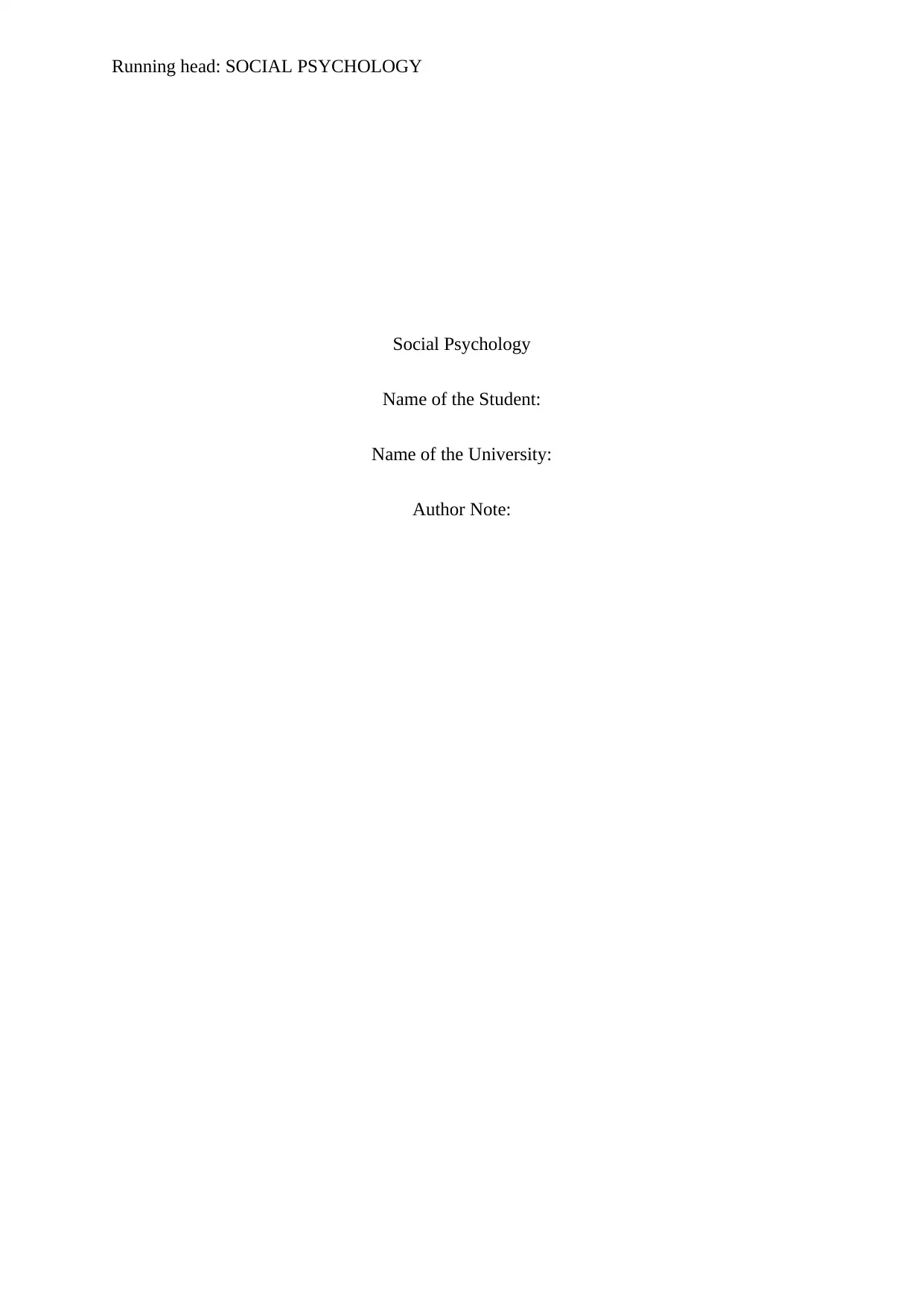
Running head: SOCIAL PSYCHOLOGY
Social Psychology
Name of the Student:
Name of the University:
Author Note:
Social Psychology
Name of the Student:
Name of the University:
Author Note:
Paraphrase This Document
Need a fresh take? Get an instant paraphrase of this document with our AI Paraphraser
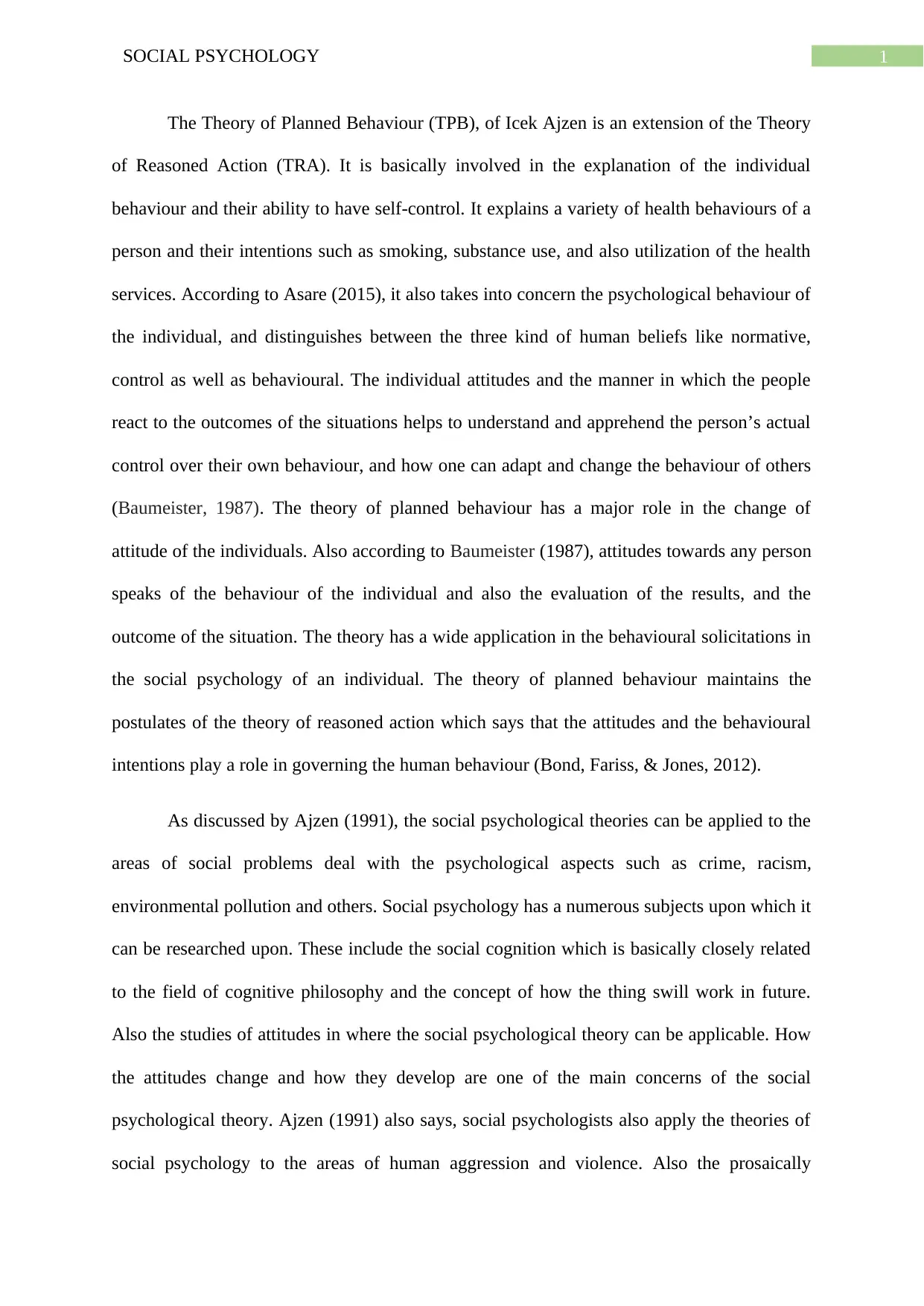
1SOCIAL PSYCHOLOGY
The Theory of Planned Behaviour (TPB), of Icek Ajzen is an extension of the Theory
of Reasoned Action (TRA). It is basically involved in the explanation of the individual
behaviour and their ability to have self-control. It explains a variety of health behaviours of a
person and their intentions such as smoking, substance use, and also utilization of the health
services. According to Asare (2015), it also takes into concern the psychological behaviour of
the individual, and distinguishes between the three kind of human beliefs like normative,
control as well as behavioural. The individual attitudes and the manner in which the people
react to the outcomes of the situations helps to understand and apprehend the person’s actual
control over their own behaviour, and how one can adapt and change the behaviour of others
(Baumeister, 1987). The theory of planned behaviour has a major role in the change of
attitude of the individuals. Also according to Baumeister (1987), attitudes towards any person
speaks of the behaviour of the individual and also the evaluation of the results, and the
outcome of the situation. The theory has a wide application in the behavioural solicitations in
the social psychology of an individual. The theory of planned behaviour maintains the
postulates of the theory of reasoned action which says that the attitudes and the behavioural
intentions play a role in governing the human behaviour (Bond, Fariss, & Jones, 2012).
As discussed by Ajzen (1991), the social psychological theories can be applied to the
areas of social problems deal with the psychological aspects such as crime, racism,
environmental pollution and others. Social psychology has a numerous subjects upon which it
can be researched upon. These include the social cognition which is basically closely related
to the field of cognitive philosophy and the concept of how the thing swill work in future.
Also the studies of attitudes in where the social psychological theory can be applicable. How
the attitudes change and how they develop are one of the main concerns of the social
psychological theory. Ajzen (1991) also says, social psychologists also apply the theories of
social psychology to the areas of human aggression and violence. Also the prosaically
The Theory of Planned Behaviour (TPB), of Icek Ajzen is an extension of the Theory
of Reasoned Action (TRA). It is basically involved in the explanation of the individual
behaviour and their ability to have self-control. It explains a variety of health behaviours of a
person and their intentions such as smoking, substance use, and also utilization of the health
services. According to Asare (2015), it also takes into concern the psychological behaviour of
the individual, and distinguishes between the three kind of human beliefs like normative,
control as well as behavioural. The individual attitudes and the manner in which the people
react to the outcomes of the situations helps to understand and apprehend the person’s actual
control over their own behaviour, and how one can adapt and change the behaviour of others
(Baumeister, 1987). The theory of planned behaviour has a major role in the change of
attitude of the individuals. Also according to Baumeister (1987), attitudes towards any person
speaks of the behaviour of the individual and also the evaluation of the results, and the
outcome of the situation. The theory has a wide application in the behavioural solicitations in
the social psychology of an individual. The theory of planned behaviour maintains the
postulates of the theory of reasoned action which says that the attitudes and the behavioural
intentions play a role in governing the human behaviour (Bond, Fariss, & Jones, 2012).
As discussed by Ajzen (1991), the social psychological theories can be applied to the
areas of social problems deal with the psychological aspects such as crime, racism,
environmental pollution and others. Social psychology has a numerous subjects upon which it
can be researched upon. These include the social cognition which is basically closely related
to the field of cognitive philosophy and the concept of how the thing swill work in future.
Also the studies of attitudes in where the social psychological theory can be applicable. How
the attitudes change and how they develop are one of the main concerns of the social
psychological theory. Ajzen (1991) also says, social psychologists also apply the theories of
social psychology to the areas of human aggression and violence. Also the prosaically
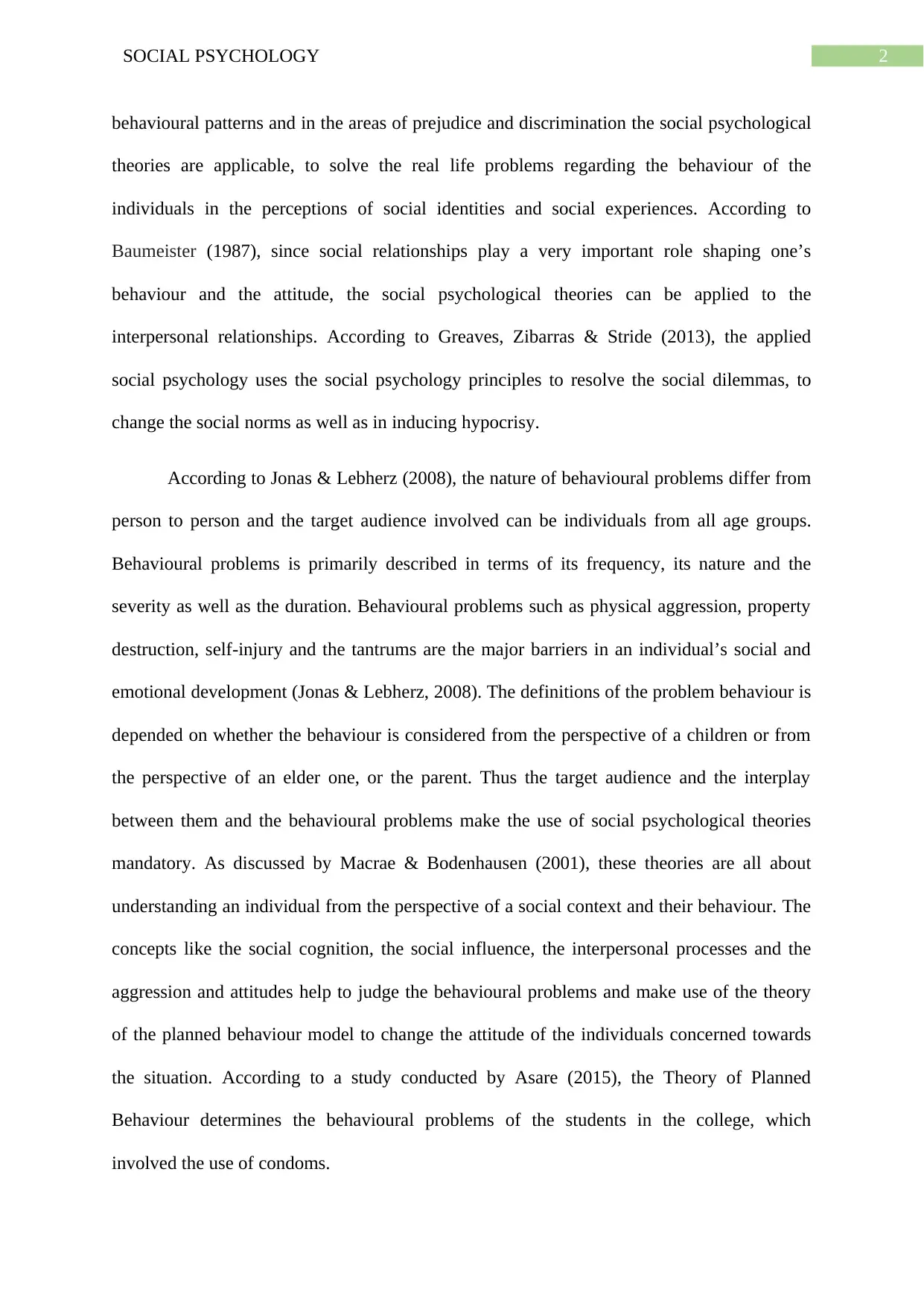
2SOCIAL PSYCHOLOGY
behavioural patterns and in the areas of prejudice and discrimination the social psychological
theories are applicable, to solve the real life problems regarding the behaviour of the
individuals in the perceptions of social identities and social experiences. According to
Baumeister (1987), since social relationships play a very important role shaping one’s
behaviour and the attitude, the social psychological theories can be applied to the
interpersonal relationships. According to Greaves, Zibarras & Stride (2013), the applied
social psychology uses the social psychology principles to resolve the social dilemmas, to
change the social norms as well as in inducing hypocrisy.
According to Jonas & Lebherz (2008), the nature of behavioural problems differ from
person to person and the target audience involved can be individuals from all age groups.
Behavioural problems is primarily described in terms of its frequency, its nature and the
severity as well as the duration. Behavioural problems such as physical aggression, property
destruction, self-injury and the tantrums are the major barriers in an individual’s social and
emotional development (Jonas & Lebherz, 2008). The definitions of the problem behaviour is
depended on whether the behaviour is considered from the perspective of a children or from
the perspective of an elder one, or the parent. Thus the target audience and the interplay
between them and the behavioural problems make the use of social psychological theories
mandatory. As discussed by Macrae & Bodenhausen (2001), these theories are all about
understanding an individual from the perspective of a social context and their behaviour. The
concepts like the social cognition, the social influence, the interpersonal processes and the
aggression and attitudes help to judge the behavioural problems and make use of the theory
of the planned behaviour model to change the attitude of the individuals concerned towards
the situation. According to a study conducted by Asare (2015), the Theory of Planned
Behaviour determines the behavioural problems of the students in the college, which
involved the use of condoms.
behavioural patterns and in the areas of prejudice and discrimination the social psychological
theories are applicable, to solve the real life problems regarding the behaviour of the
individuals in the perceptions of social identities and social experiences. According to
Baumeister (1987), since social relationships play a very important role shaping one’s
behaviour and the attitude, the social psychological theories can be applied to the
interpersonal relationships. According to Greaves, Zibarras & Stride (2013), the applied
social psychology uses the social psychology principles to resolve the social dilemmas, to
change the social norms as well as in inducing hypocrisy.
According to Jonas & Lebherz (2008), the nature of behavioural problems differ from
person to person and the target audience involved can be individuals from all age groups.
Behavioural problems is primarily described in terms of its frequency, its nature and the
severity as well as the duration. Behavioural problems such as physical aggression, property
destruction, self-injury and the tantrums are the major barriers in an individual’s social and
emotional development (Jonas & Lebherz, 2008). The definitions of the problem behaviour is
depended on whether the behaviour is considered from the perspective of a children or from
the perspective of an elder one, or the parent. Thus the target audience and the interplay
between them and the behavioural problems make the use of social psychological theories
mandatory. As discussed by Macrae & Bodenhausen (2001), these theories are all about
understanding an individual from the perspective of a social context and their behaviour. The
concepts like the social cognition, the social influence, the interpersonal processes and the
aggression and attitudes help to judge the behavioural problems and make use of the theory
of the planned behaviour model to change the attitude of the individuals concerned towards
the situation. According to a study conducted by Asare (2015), the Theory of Planned
Behaviour determines the behavioural problems of the students in the college, which
involved the use of condoms.
⊘ This is a preview!⊘
Do you want full access?
Subscribe today to unlock all pages.

Trusted by 1+ million students worldwide
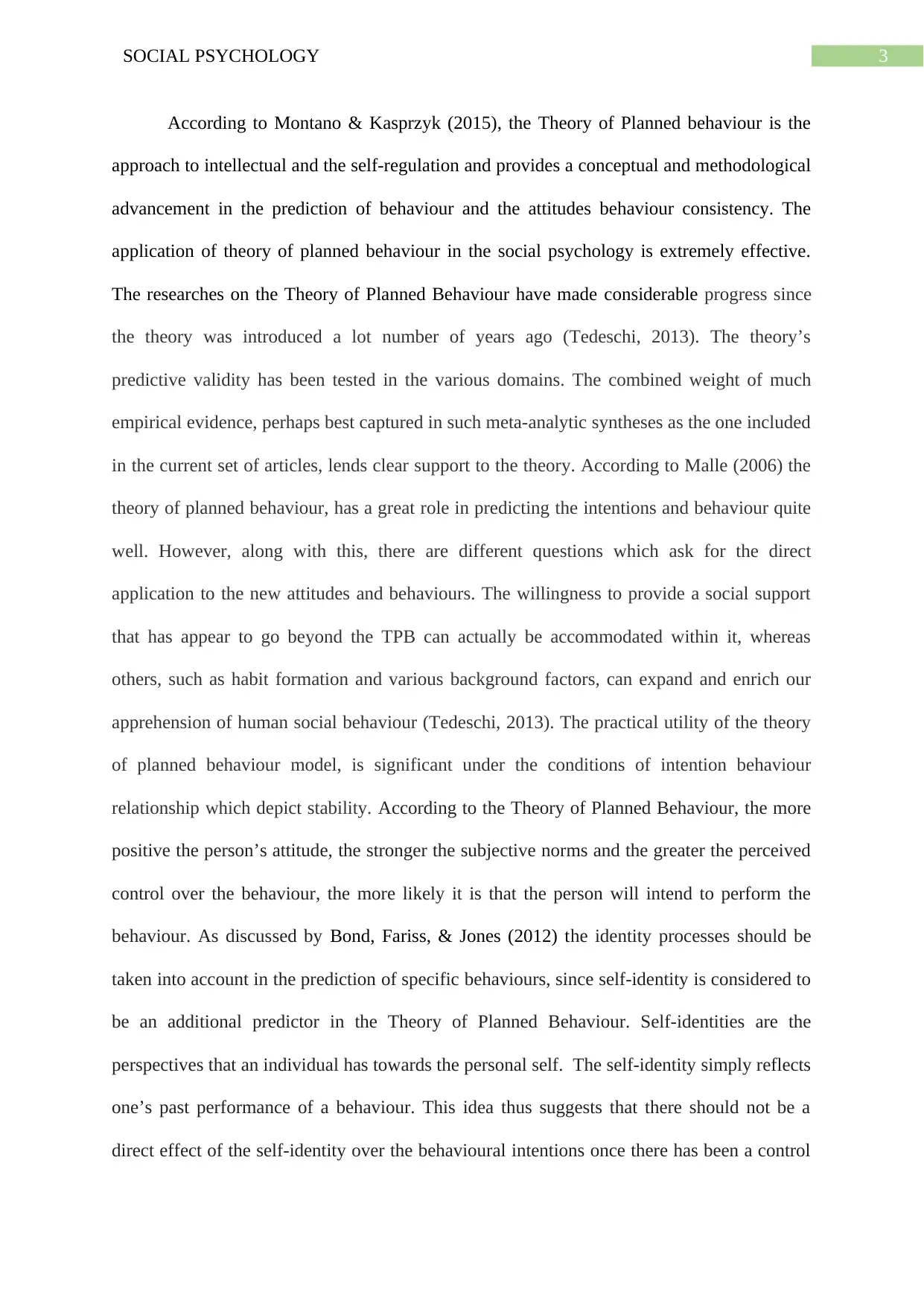
3SOCIAL PSYCHOLOGY
According to Montano & Kasprzyk (2015), the Theory of Planned behaviour is the
approach to intellectual and the self-regulation and provides a conceptual and methodological
advancement in the prediction of behaviour and the attitudes behaviour consistency. The
application of theory of planned behaviour in the social psychology is extremely effective.
The researches on the Theory of Planned Behaviour have made considerable progress since
the theory was introduced a lot number of years ago (Tedeschi, 2013). The theory’s
predictive validity has been tested in the various domains. The combined weight of much
empirical evidence, perhaps best captured in such meta-analytic syntheses as the one included
in the current set of articles, lends clear support to the theory. According to Malle (2006) the
theory of planned behaviour, has a great role in predicting the intentions and behaviour quite
well. However, along with this, there are different questions which ask for the direct
application to the new attitudes and behaviours. The willingness to provide a social support
that has appear to go beyond the TPB can actually be accommodated within it, whereas
others, such as habit formation and various background factors, can expand and enrich our
apprehension of human social behaviour (Tedeschi, 2013). The practical utility of the theory
of planned behaviour model, is significant under the conditions of intention behaviour
relationship which depict stability. According to the Theory of Planned Behaviour, the more
positive the person’s attitude, the stronger the subjective norms and the greater the perceived
control over the behaviour, the more likely it is that the person will intend to perform the
behaviour. As discussed by Bond, Fariss, & Jones (2012) the identity processes should be
taken into account in the prediction of specific behaviours, since self-identity is considered to
be an additional predictor in the Theory of Planned Behaviour. Self-identities are the
perspectives that an individual has towards the personal self. The self-identity simply reflects
one’s past performance of a behaviour. This idea thus suggests that there should not be a
direct effect of the self-identity over the behavioural intentions once there has been a control
According to Montano & Kasprzyk (2015), the Theory of Planned behaviour is the
approach to intellectual and the self-regulation and provides a conceptual and methodological
advancement in the prediction of behaviour and the attitudes behaviour consistency. The
application of theory of planned behaviour in the social psychology is extremely effective.
The researches on the Theory of Planned Behaviour have made considerable progress since
the theory was introduced a lot number of years ago (Tedeschi, 2013). The theory’s
predictive validity has been tested in the various domains. The combined weight of much
empirical evidence, perhaps best captured in such meta-analytic syntheses as the one included
in the current set of articles, lends clear support to the theory. According to Malle (2006) the
theory of planned behaviour, has a great role in predicting the intentions and behaviour quite
well. However, along with this, there are different questions which ask for the direct
application to the new attitudes and behaviours. The willingness to provide a social support
that has appear to go beyond the TPB can actually be accommodated within it, whereas
others, such as habit formation and various background factors, can expand and enrich our
apprehension of human social behaviour (Tedeschi, 2013). The practical utility of the theory
of planned behaviour model, is significant under the conditions of intention behaviour
relationship which depict stability. According to the Theory of Planned Behaviour, the more
positive the person’s attitude, the stronger the subjective norms and the greater the perceived
control over the behaviour, the more likely it is that the person will intend to perform the
behaviour. As discussed by Bond, Fariss, & Jones (2012) the identity processes should be
taken into account in the prediction of specific behaviours, since self-identity is considered to
be an additional predictor in the Theory of Planned Behaviour. Self-identities are the
perspectives that an individual has towards the personal self. The self-identity simply reflects
one’s past performance of a behaviour. This idea thus suggests that there should not be a
direct effect of the self-identity over the behavioural intentions once there has been a control
Paraphrase This Document
Need a fresh take? Get an instant paraphrase of this document with our AI Paraphraser
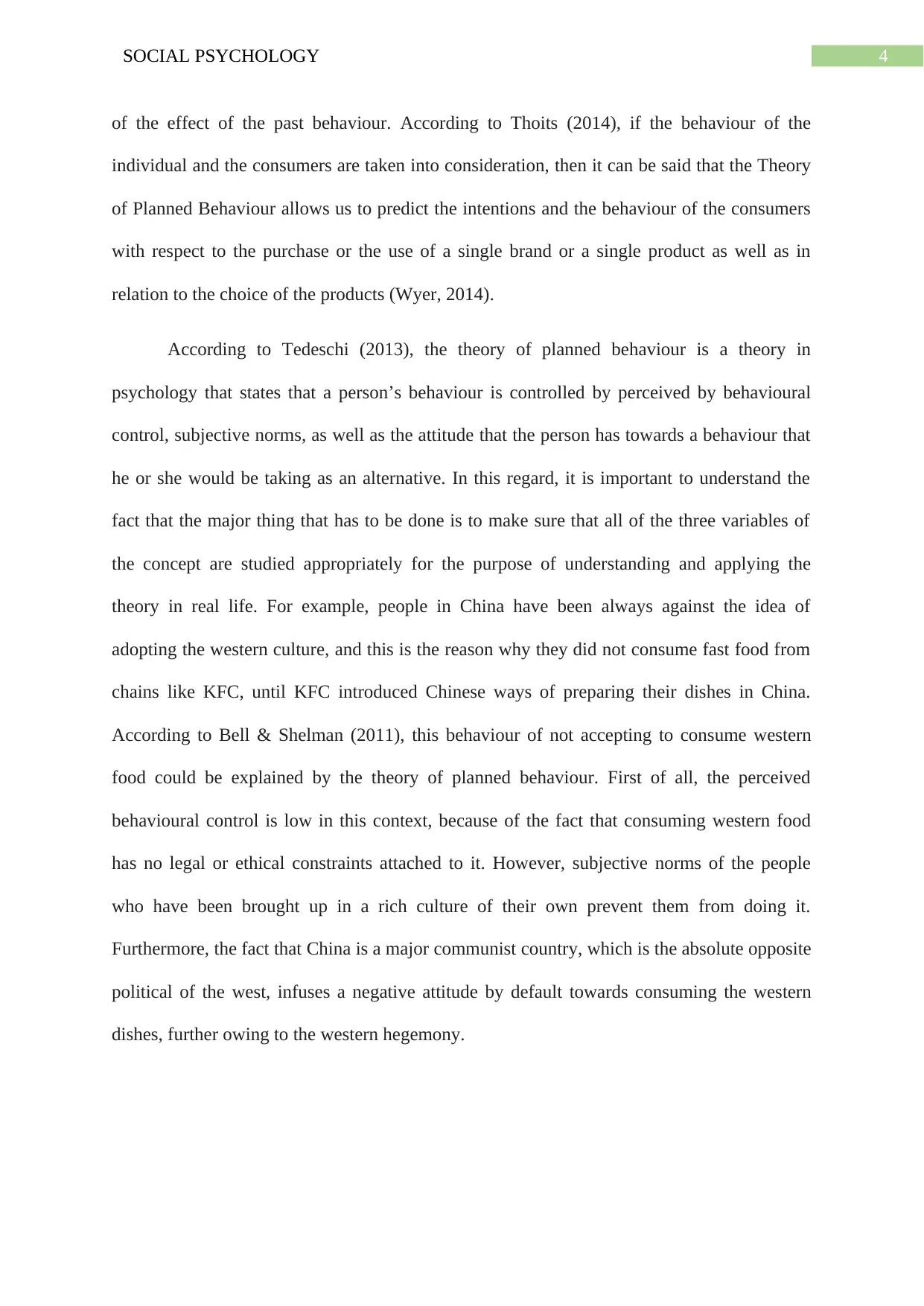
4SOCIAL PSYCHOLOGY
of the effect of the past behaviour. According to Thoits (2014), if the behaviour of the
individual and the consumers are taken into consideration, then it can be said that the Theory
of Planned Behaviour allows us to predict the intentions and the behaviour of the consumers
with respect to the purchase or the use of a single brand or a single product as well as in
relation to the choice of the products (Wyer, 2014).
According to Tedeschi (2013), the theory of planned behaviour is a theory in
psychology that states that a person’s behaviour is controlled by perceived by behavioural
control, subjective norms, as well as the attitude that the person has towards a behaviour that
he or she would be taking as an alternative. In this regard, it is important to understand the
fact that the major thing that has to be done is to make sure that all of the three variables of
the concept are studied appropriately for the purpose of understanding and applying the
theory in real life. For example, people in China have been always against the idea of
adopting the western culture, and this is the reason why they did not consume fast food from
chains like KFC, until KFC introduced Chinese ways of preparing their dishes in China.
According to Bell & Shelman (2011), this behaviour of not accepting to consume western
food could be explained by the theory of planned behaviour. First of all, the perceived
behavioural control is low in this context, because of the fact that consuming western food
has no legal or ethical constraints attached to it. However, subjective norms of the people
who have been brought up in a rich culture of their own prevent them from doing it.
Furthermore, the fact that China is a major communist country, which is the absolute opposite
political of the west, infuses a negative attitude by default towards consuming the western
dishes, further owing to the western hegemony.
of the effect of the past behaviour. According to Thoits (2014), if the behaviour of the
individual and the consumers are taken into consideration, then it can be said that the Theory
of Planned Behaviour allows us to predict the intentions and the behaviour of the consumers
with respect to the purchase or the use of a single brand or a single product as well as in
relation to the choice of the products (Wyer, 2014).
According to Tedeschi (2013), the theory of planned behaviour is a theory in
psychology that states that a person’s behaviour is controlled by perceived by behavioural
control, subjective norms, as well as the attitude that the person has towards a behaviour that
he or she would be taking as an alternative. In this regard, it is important to understand the
fact that the major thing that has to be done is to make sure that all of the three variables of
the concept are studied appropriately for the purpose of understanding and applying the
theory in real life. For example, people in China have been always against the idea of
adopting the western culture, and this is the reason why they did not consume fast food from
chains like KFC, until KFC introduced Chinese ways of preparing their dishes in China.
According to Bell & Shelman (2011), this behaviour of not accepting to consume western
food could be explained by the theory of planned behaviour. First of all, the perceived
behavioural control is low in this context, because of the fact that consuming western food
has no legal or ethical constraints attached to it. However, subjective norms of the people
who have been brought up in a rich culture of their own prevent them from doing it.
Furthermore, the fact that China is a major communist country, which is the absolute opposite
political of the west, infuses a negative attitude by default towards consuming the western
dishes, further owing to the western hegemony.
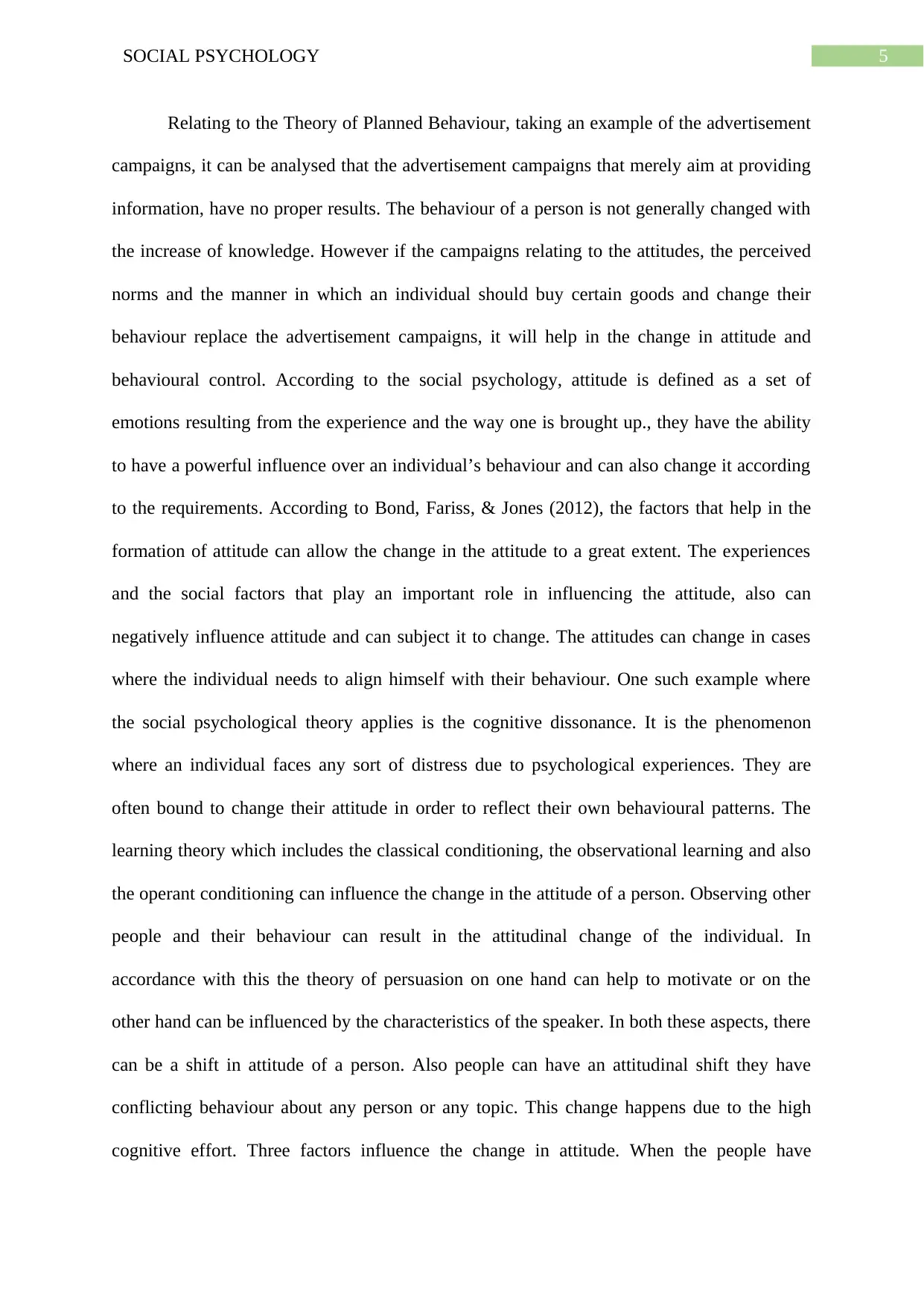
5SOCIAL PSYCHOLOGY
Relating to the Theory of Planned Behaviour, taking an example of the advertisement
campaigns, it can be analysed that the advertisement campaigns that merely aim at providing
information, have no proper results. The behaviour of a person is not generally changed with
the increase of knowledge. However if the campaigns relating to the attitudes, the perceived
norms and the manner in which an individual should buy certain goods and change their
behaviour replace the advertisement campaigns, it will help in the change in attitude and
behavioural control. According to the social psychology, attitude is defined as a set of
emotions resulting from the experience and the way one is brought up., they have the ability
to have a powerful influence over an individual’s behaviour and can also change it according
to the requirements. According to Bond, Fariss, & Jones (2012), the factors that help in the
formation of attitude can allow the change in the attitude to a great extent. The experiences
and the social factors that play an important role in influencing the attitude, also can
negatively influence attitude and can subject it to change. The attitudes can change in cases
where the individual needs to align himself with their behaviour. One such example where
the social psychological theory applies is the cognitive dissonance. It is the phenomenon
where an individual faces any sort of distress due to psychological experiences. They are
often bound to change their attitude in order to reflect their own behavioural patterns. The
learning theory which includes the classical conditioning, the observational learning and also
the operant conditioning can influence the change in the attitude of a person. Observing other
people and their behaviour can result in the attitudinal change of the individual. In
accordance with this the theory of persuasion on one hand can help to motivate or on the
other hand can be influenced by the characteristics of the speaker. In both these aspects, there
can be a shift in attitude of a person. Also people can have an attitudinal shift they have
conflicting behaviour about any person or any topic. This change happens due to the high
cognitive effort. Three factors influence the change in attitude. When the people have
Relating to the Theory of Planned Behaviour, taking an example of the advertisement
campaigns, it can be analysed that the advertisement campaigns that merely aim at providing
information, have no proper results. The behaviour of a person is not generally changed with
the increase of knowledge. However if the campaigns relating to the attitudes, the perceived
norms and the manner in which an individual should buy certain goods and change their
behaviour replace the advertisement campaigns, it will help in the change in attitude and
behavioural control. According to the social psychology, attitude is defined as a set of
emotions resulting from the experience and the way one is brought up., they have the ability
to have a powerful influence over an individual’s behaviour and can also change it according
to the requirements. According to Bond, Fariss, & Jones (2012), the factors that help in the
formation of attitude can allow the change in the attitude to a great extent. The experiences
and the social factors that play an important role in influencing the attitude, also can
negatively influence attitude and can subject it to change. The attitudes can change in cases
where the individual needs to align himself with their behaviour. One such example where
the social psychological theory applies is the cognitive dissonance. It is the phenomenon
where an individual faces any sort of distress due to psychological experiences. They are
often bound to change their attitude in order to reflect their own behavioural patterns. The
learning theory which includes the classical conditioning, the observational learning and also
the operant conditioning can influence the change in the attitude of a person. Observing other
people and their behaviour can result in the attitudinal change of the individual. In
accordance with this the theory of persuasion on one hand can help to motivate or on the
other hand can be influenced by the characteristics of the speaker. In both these aspects, there
can be a shift in attitude of a person. Also people can have an attitudinal shift they have
conflicting behaviour about any person or any topic. This change happens due to the high
cognitive effort. Three factors influence the change in attitude. When the people have
⊘ This is a preview!⊘
Do you want full access?
Subscribe today to unlock all pages.

Trusted by 1+ million students worldwide
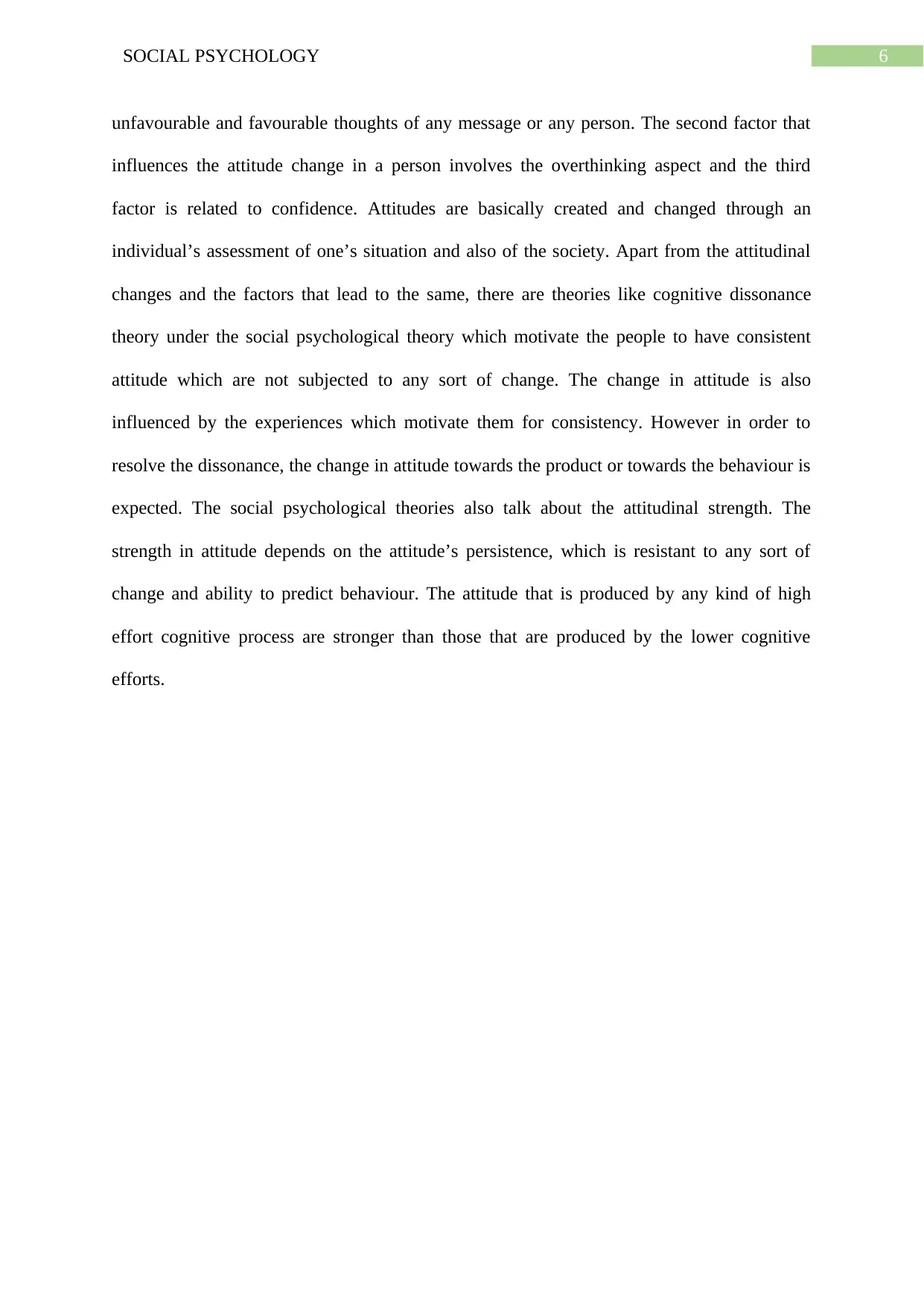
6SOCIAL PSYCHOLOGY
unfavourable and favourable thoughts of any message or any person. The second factor that
influences the attitude change in a person involves the overthinking aspect and the third
factor is related to confidence. Attitudes are basically created and changed through an
individual’s assessment of one’s situation and also of the society. Apart from the attitudinal
changes and the factors that lead to the same, there are theories like cognitive dissonance
theory under the social psychological theory which motivate the people to have consistent
attitude which are not subjected to any sort of change. The change in attitude is also
influenced by the experiences which motivate them for consistency. However in order to
resolve the dissonance, the change in attitude towards the product or towards the behaviour is
expected. The social psychological theories also talk about the attitudinal strength. The
strength in attitude depends on the attitude’s persistence, which is resistant to any sort of
change and ability to predict behaviour. The attitude that is produced by any kind of high
effort cognitive process are stronger than those that are produced by the lower cognitive
efforts.
unfavourable and favourable thoughts of any message or any person. The second factor that
influences the attitude change in a person involves the overthinking aspect and the third
factor is related to confidence. Attitudes are basically created and changed through an
individual’s assessment of one’s situation and also of the society. Apart from the attitudinal
changes and the factors that lead to the same, there are theories like cognitive dissonance
theory under the social psychological theory which motivate the people to have consistent
attitude which are not subjected to any sort of change. The change in attitude is also
influenced by the experiences which motivate them for consistency. However in order to
resolve the dissonance, the change in attitude towards the product or towards the behaviour is
expected. The social psychological theories also talk about the attitudinal strength. The
strength in attitude depends on the attitude’s persistence, which is resistant to any sort of
change and ability to predict behaviour. The attitude that is produced by any kind of high
effort cognitive process are stronger than those that are produced by the lower cognitive
efforts.
Paraphrase This Document
Need a fresh take? Get an instant paraphrase of this document with our AI Paraphraser
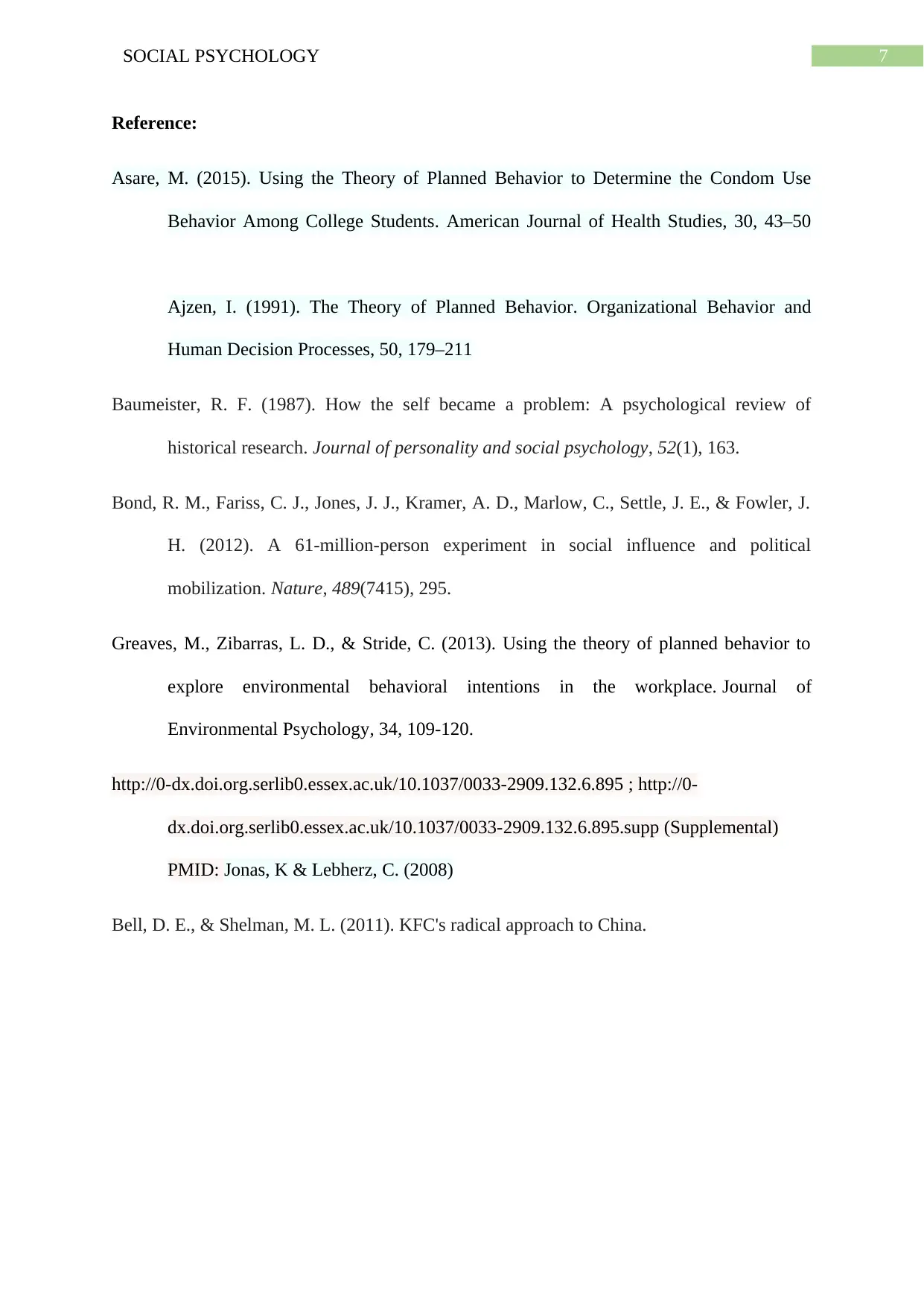
7SOCIAL PSYCHOLOGY
Reference:
Asare, M. (2015). Using the Theory of Planned Behavior to Determine the Condom Use
Behavior Among College Students. American Journal of Health Studies, 30, 43–50
Ajzen, I. (1991). The Theory of Planned Behavior. Organizational Behavior and
Human Decision Processes, 50, 179–211
Baumeister, R. F. (1987). How the self became a problem: A psychological review of
historical research. Journal of personality and social psychology, 52(1), 163.
Bond, R. M., Fariss, C. J., Jones, J. J., Kramer, A. D., Marlow, C., Settle, J. E., & Fowler, J.
H. (2012). A 61-million-person experiment in social influence and political
mobilization. Nature, 489(7415), 295.
Greaves, M., Zibarras, L. D., & Stride, C. (2013). Using the theory of planned behavior to
explore environmental behavioral intentions in the workplace. Journal of
Environmental Psychology, 34, 109-120.
http://0-dx.doi.org.serlib0.essex.ac.uk/10.1037/0033-2909.132.6.895 ; http://0-
dx.doi.org.serlib0.essex.ac.uk/10.1037/0033-2909.132.6.895.supp (Supplemental)
PMID: Jonas, K & Lebherz, C. (2008)
Bell, D. E., & Shelman, M. L. (2011). KFC's radical approach to China.
Reference:
Asare, M. (2015). Using the Theory of Planned Behavior to Determine the Condom Use
Behavior Among College Students. American Journal of Health Studies, 30, 43–50
Ajzen, I. (1991). The Theory of Planned Behavior. Organizational Behavior and
Human Decision Processes, 50, 179–211
Baumeister, R. F. (1987). How the self became a problem: A psychological review of
historical research. Journal of personality and social psychology, 52(1), 163.
Bond, R. M., Fariss, C. J., Jones, J. J., Kramer, A. D., Marlow, C., Settle, J. E., & Fowler, J.
H. (2012). A 61-million-person experiment in social influence and political
mobilization. Nature, 489(7415), 295.
Greaves, M., Zibarras, L. D., & Stride, C. (2013). Using the theory of planned behavior to
explore environmental behavioral intentions in the workplace. Journal of
Environmental Psychology, 34, 109-120.
http://0-dx.doi.org.serlib0.essex.ac.uk/10.1037/0033-2909.132.6.895 ; http://0-
dx.doi.org.serlib0.essex.ac.uk/10.1037/0033-2909.132.6.895.supp (Supplemental)
PMID: Jonas, K & Lebherz, C. (2008)
Bell, D. E., & Shelman, M. L. (2011). KFC's radical approach to China.
1 out of 8
Related Documents
Your All-in-One AI-Powered Toolkit for Academic Success.
+13062052269
info@desklib.com
Available 24*7 on WhatsApp / Email
![[object Object]](/_next/static/media/star-bottom.7253800d.svg)
Unlock your academic potential
Copyright © 2020–2026 A2Z Services. All Rights Reserved. Developed and managed by ZUCOL.





